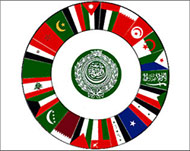Arab League: Fifty-nine years on
On 22 March 1945 representatives from Egypt, Syria, Iraq, Lebanon, Transjordan (now Jordan), Saudi Arabia and Yemen signed the Arab League accord in Cairo.

The league was established to promote economic development, settle disputes between Arab countries, and coordinate political aims.
Over the years 15 other Arab countries joined the league, the last one was the Comoros in 1993, increasing the number of member states to the present 22.
Upon the establishment of Israel in 1948, armies of the seven founding states joined forces to try to expel Israelis from the land on which they had declared their state. The Israelis won the war. The league’s first notable achievement came in 1950, with the signing of the Arab mutual defence treaty.
Economically and socially
Though, it started with strong aspirations to establish a platform for Arab economic integration, it has achieved little in this area.
In 1964 the league issued a resolution establishing the Common Arab Market, but the project remains mere ink on paper until this day.
Socially, the Arab League has had relatively more success with the establishment in 1964 of the Educational, Cultural and Scientific Organisation (ALESCO).
 |
|
The Arab League consists of 22 |
The league has also widely contributed to educational, social and health services throughout member states. Scholarships and medical assistance have been given to nationals of poorer Arab countries with richer Arab countries supporting these activities under the umbrella of the Arab League.
Politically
The Arab League played a key role in uniting Arab countries in their handling of a number of crucial crises, such as nationalising the Suez and the 1956 war on Egypt.
Following the Arab defeat in the 1967 war with Israel the Arab League worked on reorganising political coordination, and succeeded.
|
“They wanted us in an English league, but here we are announcing an Arab one” Abd al-Rahman Azam said in the League’s opening session |
Despite Jordanian objections, in 1964 the Arab League admitted the Palestinian Liberation Organisation as the representative of all Palestinians.
The league received a major setback after the signing of the Egypt–Israel peace treaty in March 1979. Conflicts over policy with Israel intensified, eventually the league’s headquarters were moved from Cairo, Egypt, to the Tunisian capital of Tunis. Egypt’s membership of the Arab League was suspended.
Ten years later Egypt’s membership was reinstated and the headquarters were moved back to Cairo in 1990. In that same year, Iraqi forces invaded Kuwait, an Arab League member state. The move created deep divisions within the organisation.
Their performance after the first Gulf war in 1991 was marred by fundamental differences on how it should deal with the sanctions imposed on Iraq by the United Nations.
Whereas, Kuwait, Arab Gulf States, and US allies wanted full Iraqi compliance with UN resolutions, before discussing an Arab effort to lift the sanctions, some Arab states such as Yemen, Jordan, and Sudan saw the sanctions as unnecessary since Iraq had been driven out of Kuwait.
|
Related links |
Upon the invasion of Iraq and its subsequent occupation by US-led forces, the Arab League’s performance has been widely criticised. In particular critics claim that the organisation was a lot less enthusiastic in its efforts to resist the occupation of Iraq as compared to their reaction against Iraq when it occupied Kuwait.
Its failure to act to prevent the occupation of Iraq has triggered calls from inside the Arab world to reform the Arab League. Following the US release of its Greater Middle East Plan, the league finds itself in a position similar to that of Arab states, whether or not to accept reforms inspired by foreign powers.
Observers see the coming Arab summit in Tunisia on 29 March, 2004 as crucial in determining the future of the organisation.